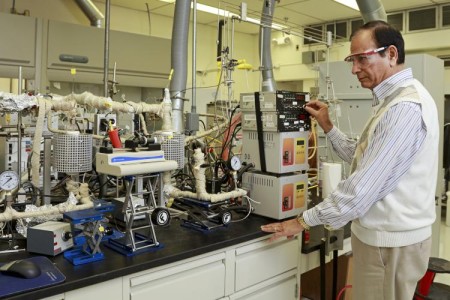Nov
5
Progress Converting Ethanol to Petrochemical Products
November 5, 2015 | Leave a Comment
ORNL’s Chaitanya Narula said, “Our method of direct conversion of ethanol offers a pathway to produce suitable hydrocarbon blend-stock that may be blended at a refinery to yield fuels such as gasoline, diesel and jet fuel or commodity chemicals.”

Chaitanya Narula led analysis of an ORNL biofuel-to-hydrocarbon conversion technology to explain the underlying process. Click image for the largest view.
Scientists have experimented for decades with a class of catalysts known as zeolites that transform alcohols such as ethanol into higher-grade hydrocarbons. As ORNL researchers were developing a new type of zeolite-based conversion technology, they found the underlying reaction unfolds in a different manner than previously thought.
ORNL’s Brian Davison said, “For 40 years, everyone thought that these reactions must go first from ethanol to ethylene, and then from there it forms longer chains. We were able to show that it’s not how this occurs.”
The team’s study has been published in Nature Scientific Reports.
The researchers’ analysis found that this energy-consuming intermediary step is not necessary for the conversion to happen. Instead, an energy-producing “hydrocarbon pool” mechanism allows the zeolite catalysts to directly produce longer hydrocarbon chains from the original alcohols.
Narula explained, “It challenges a long-held but incorrect assumption. It has been assumed that you must go from ethanol to ethylene, which is endothermic and requires energy. We showed this step doesn’t occur, and that the overall reaction is slightly exothermic.”
ORNL researchers tracked the molecular transition in labeling experiments with deuterium, a hydrogen isotope, to confirm the hydrocarbon pool mechanism.
The research, supported by DOE’s BioEnergy Technologies Office, has implications for the energy efficiency and cost of catalytic upgrading technologies proposed for use in bio-refineries. Uncovering the mechanism behind the reaction helps support the potential economic viability of ORNL’s direct biofuel-to-hydrocarbon conversion approach.
The ORNL-developed catalyst and conversion process were licensed in 2014 to Vertimass, a startup company based in Irvine, CA. ORNL researchers are working with Vertimass through a separate DOE-funded project to scale the technology to the commercial level.
The news here is likely to cheer up the sugarcane and corn based ethanol producers as well as put some more potential into the cellulosic ethanol research effort. Up rating biofuels to more energy dense products like gasoline and diesel would have a positive effect on adding more fuels to the market keeping prices a little lower. At about 90 million barrels a day of crude oil production there is a lot of room to grow.

